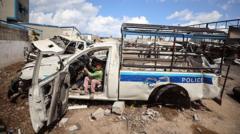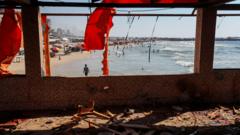A senior Hamas security officer disclosed that the group has lost approximately 80% of its control over Gaza due to relentless Israeli strikes. With Hamas's leadership decimated and lawlessness spreading, armed clans have emerged to fill the power vacuum, raising concerns about the group’s future amid internal strife and external military pressure.
Hamas Security Officer Warns of Disintegration Within Gaza Strip Amid Ongoing Conflict

Hamas Security Officer Warns of Disintegration Within Gaza Strip Amid Ongoing Conflict
An anonymous senior Hamas officer reveals the group's substantial loss of control over Gaza, citing internal collapse and the rise of rival armed clans.
Hamas's command structure is reportedly in disarray, with a lieutenant colonel disclosing to the BBC that about 80% of their control over the Gaza Strip has collapsed, giving way to armed clans taking over areas previously governed by the group. The officer, who wished to remain anonymous for safety reasons, stated that the continuous Israeli bombardment has drastically weakened Hamas’s political, military, and security leadership.
"The security structure is barely intact," he said in several voice messages. "Most of the leadership is dead, and the remaining figures are either inactive or in hiding." The officer emphasized that Israel's military advantage, coupled with international indifference, allows for continued aggression against Hamas, suggesting that the situation is primed for further conflict.
He explained that a recent airstrike claimed the lives of at least 18 individuals who were part of a Hamas-run police operation in Deir al-Balah, targeting vendors accused of exploiting the humanitarian crisis. This further illustrates the desperate attempt by Hamas to assert control amid chaos.
Local security has deteriorated to the point where armed gangs now operate freely, posing dangers to civilians without intervention. "These gangs can stop you, kill you. There's no one to argue against them," the officer noted, expressing particular concern over the rise of local armed clans who are gaining strength and influence.
One such figure among these emerging clans is Yasser Abu Shabab, who, according to the officer, is in contact with other local groups and has been supported by Israeli weapon supplies. The officer articulated fear that figures like Abu Shabab could unify Hamas's adversaries, making him a significant threat to their existence.
Public speculation suggests Abu Shabab's movement may attract support from factions within the Palestinian Authority, which opposes Hamas governance. This creates a precarious position for Hamas as it grapples with not only external threats from Israeli forces but also from potential rivals that have consolidated power within its own territory.
The retired Palestinian security official, commenting on the situation, remarked, "If Abu Shabab succeeds in destabilizing Hamas rule, he could become a rallying point for those against Hamas." With such divisions growing among its adversaries and the escalating violence throughout Gaza, Hamas faces a multifaceted crisis that could challenge its longstanding grip on power in the region.
"The security structure is barely intact," he said in several voice messages. "Most of the leadership is dead, and the remaining figures are either inactive or in hiding." The officer emphasized that Israel's military advantage, coupled with international indifference, allows for continued aggression against Hamas, suggesting that the situation is primed for further conflict.
He explained that a recent airstrike claimed the lives of at least 18 individuals who were part of a Hamas-run police operation in Deir al-Balah, targeting vendors accused of exploiting the humanitarian crisis. This further illustrates the desperate attempt by Hamas to assert control amid chaos.
Local security has deteriorated to the point where armed gangs now operate freely, posing dangers to civilians without intervention. "These gangs can stop you, kill you. There's no one to argue against them," the officer noted, expressing particular concern over the rise of local armed clans who are gaining strength and influence.
One such figure among these emerging clans is Yasser Abu Shabab, who, according to the officer, is in contact with other local groups and has been supported by Israeli weapon supplies. The officer articulated fear that figures like Abu Shabab could unify Hamas's adversaries, making him a significant threat to their existence.
Public speculation suggests Abu Shabab's movement may attract support from factions within the Palestinian Authority, which opposes Hamas governance. This creates a precarious position for Hamas as it grapples with not only external threats from Israeli forces but also from potential rivals that have consolidated power within its own territory.
The retired Palestinian security official, commenting on the situation, remarked, "If Abu Shabab succeeds in destabilizing Hamas rule, he could become a rallying point for those against Hamas." With such divisions growing among its adversaries and the escalating violence throughout Gaza, Hamas faces a multifaceted crisis that could challenge its longstanding grip on power in the region.


















